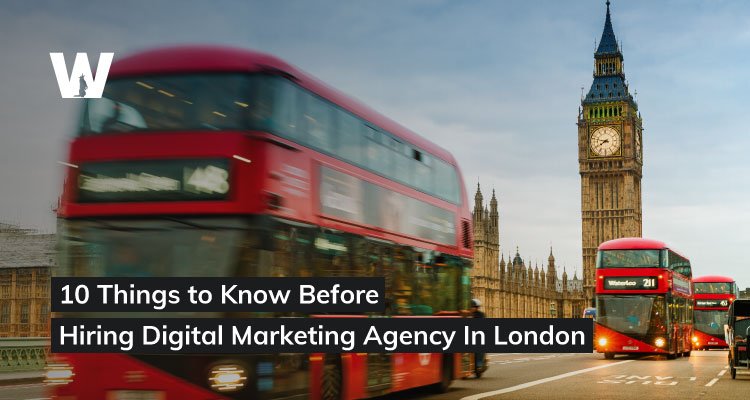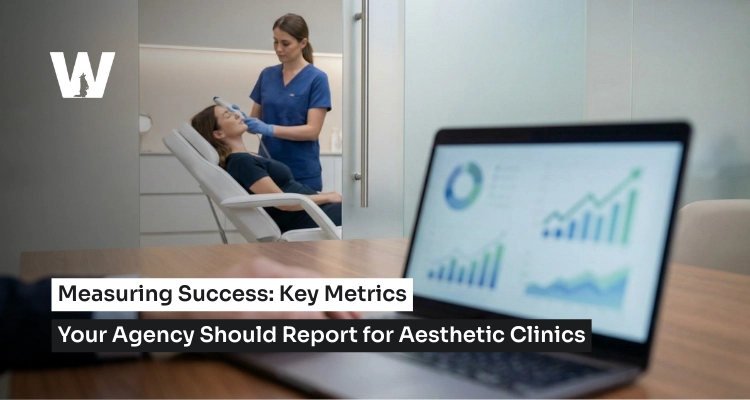Wraps up in 14 Minutes
In London's £15.7 billion digital economy, choosing the wrong marketing agency could cost your business more than money—it could cost your competitive edge. With over 40,000 digital businesses operating across the capital, from Shoreditch startups to Canary Wharf corporations, finding the right digital marketing agency partner in London, UK requires strategic thinking.
Before hiring a digital marketing agency in London, you need to understand that 73% of UK businesses that switched agencies within 12 months cited poor communication and misaligned expectations as primary reasons.
This comprehensive guide reveals the 10 critical factors that separate successful agency partnerships from expensive disappointments. Whether you're seeking an SEO agency in London, social media marketing, or complete digital transformation, these insights will save you time, money, and frustration.
1. Define Clear Digital Marketing Objectives and Budget
Start with specific, measurable goals before contacting any agency. The most successful agency partnerships begin with crystal-clear objectives that align with business outcomes, not vanity metrics.
Setting SMART Marketing Goals
Your digital marketing objectives should follow the SMART framework:
- Specific: "Increase online sales by 40%" not "get more customers"
- Measurable: Track revenue, leads, or conversion rates
- Achievable: Based on current performance and market conditions
- Relevant: Aligned with overall business strategy
- Time-bound: Set clear deadlines (quarterly, annually)
Understanding London Digital Marketing Costs
London digital marketing services typically cost 15-25% more than UK averages due to higher operational costs and talent competition. Here's what to expect:
- SEO Services: Investment varies monthly depending on the scope. Local SEO typically requires a foundational investment, National SEO a moderate investment, and Enterprise SEO a substantial investment.
- PPC Management: This generally involves a percentage of your advertising spend, plus a recurring monthly management fee.
- Content Marketing: This service usually entails a flexible monthly investment. Specific projects like blog writing require a per-article investment, while video development projects typically involve a higher per-project investment.
Budget Allocation Best Practices
Allocate your marketing budget using the 70-20-10 rule:
- 70%: Proven strategies (SEO, PPC)
- 20%: Emerging channels (TikTok, voice search)
- 10%: Experimental tactics
Hidden costs to anticipate: Setup fees, premium tool subscriptions, additional creative work, and performance bonuses. Always request a detailed breakdown of all potential expenses.
2. Verify Agency Credentials and London Market Expertise
Look beyond flashy websites—verify actual certifications and local market knowledge. A legitimate London digital marketing agency should demonstrate both technical competence and understanding of the unique London business landscape.
Essential Certifications to Verify
A legitimate agency should demonstrate expertise through verified credentials:
- Google Certifications: Partner/Premier Partner status, Google Analytics certified team members, Google Ads certifications across all platforms
- Industry Certifications: Facebook Blueprint, HubSpot certifications, LinkedIn Marketing Labs, Microsoft Advertising accreditation
These certifications demonstrate ongoing education and platform expertise essential for effective campaign management.
London Market Knowledge Indicators
Regulatory understanding encompasses GDPR compliance expertise, UK advertising standards knowledge, ICO data protection requirements, and financial services regulations where applicable.
Local platform experience should include Transport for London advertising opportunities, London-specific directories and citations, understanding of London business districts, and knowledge of the local competitor landscape.
Industry recognition through awards, case studies, and thought leadership further validates their expertise.
Red Flags to Avoid
- Reluctance to show certifications or provide verification IDs
- No local case studies or London-based clients
- Generic proposals without London market insights
- Team members without verifiable experience or LinkedIn profiles
- Promises of "guaranteed" rankings or overnight results
Verification tip: Ask for certification IDs and verify them directly with Google, Facebook, or other platforms. Legitimate agencies will gladly provide this information.
3. Analyse Agency Portfolios and Case Studies Strategically
Focus on results, not aesthetics—successful campaigns tell stories through data, not just pretty designs. The best digital marketing services London providers showcase measurable outcomes that align with business objectives.
Beyond Pretty Pictures: What Really Matters
Metrics That Matter:
- Revenue growth percentages
- Lead generation increases
- Conversion rate improvements
- Cost per acquisition reductions
- Return on ad spend (ROAS)
Case Study Analysis Framework
Industry Relevance: Look for case studies in your sector or similar business models. B2B agencies should show B2B results; e-commerce agencies should demonstrate online sales growth.
Scale Similarity: An agency that only works with large enterprise-level companies might not understand your growing startup challenges. Conversely, an agency focused on small local businesses might struggle with complex, multi-faceted projects.
Before/After Transparency: Quality case studies show:
- Starting baseline metrics
- Strategy implemented
- Timeline of improvements
- Ongoing results and optimisation
London Success Stories to Seek
Ask specifically about:
- Local London client testimonials
- Understanding of London's diverse markets
- Experience with London business regulations
- Success with London-specific SEO (local citations, Google My Business)
Portfolio red flags: Stock photos, no client names, vague results, or case studies older than 2 years. The digital landscape evolves rapidly—recent success matters most.
4. Assess Their Technology Stack and Reporting Capabilities
Your agency's tools directly impact your results—ensure they use professional-grade platforms, not free alternatives. Advanced analytics and reporting capabilities separate amateur operations from professional SEO agency London providers.
Essential Tools Audit
Professional agencies should utilise advanced platforms across key areas:
- Analytics: Google Analytics 4 expertise, Google Tag Manager implementation, Search Console monitoring, conversion tracking setup
- SEO Tools: Professional versions of SEMrush or Ahrefs for keyword research, Screaming Frog for technical audits, Moz for local SEO tracking
- Social Media: Hootsuite or Sprout Social for scheduling, native analytics tools, social listening platforms for reputation monitoring
These tools directly impact your results—ensure they use professional-grade platforms, not free alternatives.
Data Ownership Policies
Critical questions to clarify include who owns the Google Analytics account, whether you'll retain access to all advertising accounts, what happens to historical data if you switch agencies, and how data is backed up and secured.
Best practice: You should own all accounts, with the agency granted administrative access. Avoid agencies that insist on using their own accounts—this creates dependency and complicates future transitions.
Quality Reporting Standards
Monthly reports should include an executive summary with key achievements, goal progress tracking, detailed performance metrics, actionable insights and recommendations, and next month's planned activities.
Real-time access: Modern agencies provide client dashboards for 24/7 access to key metrics, not just monthly PDF reports.
5. Evaluate Communication Style and Cultural Fit
Misaligned communication styles destroy more agency relationships than poor performance. Cultural fit determines whether your partnership thrives or merely survives.
Communication Assessment Framework
Establish clear expectations for partnership communication:
- Response Times: Email responses within 24 hours, urgent issues same day, regular updates weekly/bi-weekly, formal reports monthly
- Communication Channels: Email for formal communication, Slack/Teams for quick updates, video calls for strategy discussions
- Account Management: Dedicated account manager, clear escalation procedures, direct access to senior team members
London Business Culture Considerations
Professional standards encompass punctuality for meetings and deadlines, clear and direct communication style, respect for work-life balance, and understanding of UK business etiquette.
These cultural factors determine whether your partnership thrives or merely survives the inevitable challenges of digital marketing.
Cultural Alignment Indicators
Company values compatibility involves evaluating innovation versus traditional approaches, data-driven versus creative-first decisions, collaborative versus directive working styles, and long-term versus quick-win focus.
Work style preferences include agile methodology adoption, transparent reporting practices, proactive versus reactive communication, and strategic thinking versus purely tactical execution.
6. Understand Service Scope and Specialisation Areas
Choose specialists for specific challenges or generalists for comprehensive support—but understand the trade-offs. The best approach depends on your business complexity and growth stage.
Full-Service vs. Specialised Agencies
| Full-Service Agencies | Specialised Agencies |
|---|---|
| Integrated strategies | Deep expertise |
| Single point of contact | Latest techniques |
| Cost efficiency | Proven results |
| Jack of all trades | Limited scope |
| Less deep expertise | Integration challenges |
Core Service Evaluation
Evaluate agencies across essential digital marketing services:
- SEO & Local SEO: Technical audits, local citation building, Google My Business optimisation, link building strategies, content marketing integration
- PPC & Paid Advertising: Google Ads management, Microsoft Advertising (Bing), social media advertising, display campaigns, landing page optimisation
- Content Marketing: Strategy development, blog writing and optimisation, video production, graphic design, email marketing automation
- Emerging Services: AI-powered automation, voice search optimisation, video marketing, influencer coordination, conversion rate optimisation
London-Specific Services
Local Market Expertise encompasses London business directory submissions, Transport for London advertising opportunities, London event marketing coordination, local PR and media relationships, and borough-specific targeting strategies that leverage the unique characteristics of different London areas.
7. Review Contract Terms and Flexibility Requirements
Flexible contracts protect your business—avoid long-term commitments until proven value delivery. Smart contract negotiation prevents costly mistakes and ensures scalable partnerships.
Contract Essentials Checklist
Key contract elements to negotiate:
- Notice Periods: 30-90 day notice periods (avoid 12+ month contracts), clear termination procedures, asset transfer protocols
- Service Level Agreements: Response time guarantees, deliverable timelines, performance benchmarks, penalty clauses for missed deadlines
- Performance Guarantees: Specific KPI commitments, baseline measurement periods, improvement timeframes, remedial action procedures
Flexibility Factors
Scaling capabilities should address service addition and removal processes, budget adjustment procedures, team resource allocation flexibility, and priority project handling when urgent needs arise.
Adaptation mechanisms must cover strategy modification processes, new platform adoption procedures, crisis response protocols, and market change adaptation strategies to ensure your agency partnership remains relevant as conditions evolve.
UK Legal Considerations
GDPR compliance requires comprehensive data processing agreements, privacy policy alignment, consent management procedures, and clear data retention policies.
Intellectual property rights must clarify content ownership, brand asset usage rights, strategy documentation ownership, and tool and platform access rights to prevent disputes and ensure smooth working relationships throughout the partnership duration.
8. Investigate Client Retention and Success Stories
High client retention rates indicate consistent value delivery—but verify the stories behind the statistics. The best digital marketing consultant London providers build long-term partnerships, not short-term campaigns.
Retention Rate Analysis
Industry benchmarks for agency performance:
- Excellent: 90%+ annual retention
- Good: 75-90% annual retention
- Average: 60-75% annual retention
- Poor: Below 60% annual retention
High retention indicates consistent results delivery, strong communication practices, adaptable service offerings, and fair pricing structures that create genuine value for clients over extended periods.
Client Success & London Network Check
Look for long-term client relationships (3+ years), expanding service scopes, and testimonials or case studies showing sustained value—not just short-term wins. When checking references, ask about communication, problem-solving, value for money, and how challenges were handled.
To verify a strong London presence, look for Chamber memberships, industry events, and local client ties. Cross-check testimonials, LinkedIn connections, and online reviews for a clear picture of the agency’s credibility and local reputation.
9. Test Their Strategic Thinking and Innovation Approach
Request a mini-audit or strategy session—this reveals their thinking process and industry knowledge. Strategic agencies diagnose before prescribing solutions.
Strategic Assessment Methods
Test their strategic capabilities through:
- Mini-Audit Request: Website technical analysis, competitor landscape review, current performance assessment, improvement opportunity identification
- Industry Understanding: Ask about industry-specific challenges, request competitor analysis insights, discuss regulatory considerations, evaluate market trend awareness
This reveals their thinking process and industry knowledge depth.
Innovation Indicators
Look for agencies using AI tools, automation, and testing emerging platforms. Their thought leadership shows through published insights, speaking gigs, awards, and creative campaigns.
Problem-Solving Approach
Check how they handle algorithm updates and crises—do they offer recovery plans, proactive monitoring, and clear communication? Strong crisis management includes reputation control, PR handling, and brand protection.
10. Plan the Onboarding Process and Performance Measurement
Structured onboarding sets partnership foundations—demand a clear 90-day plan with defined milestones. Proper planning prevents confusion and accelerates results.
Onboarding Excellence Markers
A structured 90-day onboarding plan should include:
- First 30 Days: Complete audit and analysis, strategy development and approval, account setup and integration, baseline measurement establishment
- Days 31-60: Initial campaign launches, content creation begins, monitoring system implementation, first performance review
- Days 61-90: Initial results analysis, strategy refinement, scaling successful tactics, long-term planning session
KPI Framework Development
Establish metrics that align with business objectives:
- Business-Aligned Metrics: Revenue and conversion tracking, lead quality and quantity, customer acquisition cost (CAC), customer lifetime value (CLV), return on marketing investment (ROMI)
- Channel-Specific KPIs: Organic traffic and keyword rankings for SEO, click-through rates and cost per click for PPC, engagement rates and follower growth for social media, content engagement and time on page for content marketing
Performance Monitoring Systems
Dashboard requirements should provide real-time data access, mobile-friendly interface, customisable metric views, and export capabilities for further analysis.
Review schedule structure involves weekly operational updates, monthly performance reviews, quarterly strategy assessments, and annual partnership evaluations to ensure continuous improvement and alignment with evolving business objectives.
Conclusion: Making the Right Choice for Your London Business
Choosing the right digital marketing agency London partner requires thorough evaluation across these 10 critical areas. The most successful partnerships combine clear objectives, verified expertise, cultural alignment, and structured performance measurement.
At Wolfable, we understand that every London business has unique challenges and opportunities. Our comprehensive approach to digital marketing services London encompasses SEO, social media marketing, graphic design, video development, and WordPress development—all delivered with transparent communication and measurable results.
Ready to experience the difference? Schedule your free strategy session today and see how we apply these 10 principles to create winning digital marketing strategies for London businesses.







